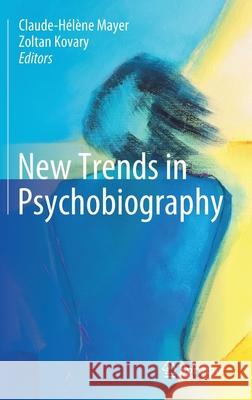New Trends in Psychobiography » książka



New Trends in Psychobiography
ISBN-13: 9783030169527 / Angielski / Twarda / 2019 / 523 str.
New Trends in Psychobiography
ISBN-13: 9783030169527 / Angielski / Twarda / 2019 / 523 str.
(netto: 536,72 VAT: 5%)
Najniższa cena z 30 dni: 539,74
ok. 16-18 dni roboczych.
Darmowa dostawa!
"New Trends demonstrates that the tradition of psychobiography is increasingly able to contribute to academic psychology, clinicians of all stripes, and humanity's understanding of itself. For those interested, psychobiography pledges an educated subjectivity, a research method that judiciously accesses the inner lives of people, and the pleasure of multidimensional portraits of the good, the bad, and the ugly." (Benjamin Wegner, Clio's Psyche, Vol. 27 (1), 2020)
Chapter 1. Introduction (Claude-Hélène Mayer).- Part 1: Theoretical, methodological and conceptual approaches in psychobiography.- Chapter 2. Executing Psychobiography (James William Anderson).- Chapter 3. Psychobiography and “psychology as a rigorous science”. Explorations in epistemology, clinical practice and university education (Zoltan Kovary).- Chapter 4. Systems Psychodynamics in Psychobiography: The individual within the (unconscious) systems' dynamics (Claude-Hélène Mayer).- Chapter 5. Old wine in new skins? Psychobiography and Positive Psychology (Claude-Hélène Mayer).- Chapter 6. Suitability Indicators in the Study of Great Lives: Guidelines for the Selection of the Psychobiographical Subject (Barbara Burnell).- Chapter 7. Distinction between high resolution and low resolution psychobiography (Ágnes Bálint).- Chapter 8. Abstractions of truth (Robert F. Mullen).- Chapter 9. An Ethics Guide to Psychobiography. Trends in Best Practice (Joseph G. Ponterotto).- Chapter 10. Aspects of Political Psychobiography (Reprint) (Avner Falk).- Part 2: Psychobiographies on selected individuals.- Chapter 11. Psychological reflections on the build-up to the first heart transplant (Roelf van Niekerk).- Chapter 12. Amor fati or posttraumatic growth? The case of Etty Hillesum in the time of the Holocaust (Márta Csabai).- Chapter 13. Jack Kerouac (William Todd Schultz).- Chapter 14. Goethe's path to creativity - A psychobiography (Rainer Matthias Holm-Hadulla).- Chapter 15. Jean Paul Sartre's psychosocial identity development - A psychobiographical perspective (Tatjana Müller).- Chapter 16. Dostoyevsky and Nietzsche – The contradictory nature of the Self in a dream of Raskolnikov and in the breakdown of Nietzsche (Tamás Témyi).- Chapter 17. Constructing "Georgia": Love, play, work as a central theme in O'Keefee's early and late memories (Athena Androutsopoulou).- Chapter 18. A Psychobiographical Portrait of Adam Small’s Eriksonian Ego-strengths or Virtues: Contextualized within South Africa’s Pre-, Middle- and Post-Apartheid eras (Paul J.P. Fouché).- Chapter 19. Time, Death, Eternity: Imagining the soul of Johann Sebastian Bach (George Atwood).- Chapter 20. The amazing life of Charlize Theron (Tracey Prenter).- Chapter 21. Dr Donald and Mr Trump. A study in political psychopathology (Avner Falk).- Chapter 22. A reflection on the psychosocial-historical turning points in the life of Sol Plaatje: Co- founder of the African National Congress (Crystal Welman).- Chapter 23. L. Ron Hubbard and Jim Jones: Narrative Identity in the Lives of Two Controversial Religious Leaders (James Kelley).- Chapter 24. The use of unusual psychological theories in psychobiography: A case study and discussion (Carol du Plessis).- Chapter 25. Specificity and evolution of (psycho-) biography of Jesus of Nazareth in the first century AD (psychobiography in the Lvov-Warsaw School) (Amadeusz Citlak).- Part 3: Applied Psychobiography.- Chapter 26. Psychobiography as an effective research methodology for the advocacy of abused and neglected youth in South Africa (Sharon Johnson).- Chapter 27. Administration of the psychobiographical care model (Erwin Böhm).
Claude-Hélène Mayer is a Full Professor in Industrial and Organisational Psychology at the University of Johannesburg, Johannesburg, South Africa and an Adjunct Professor at the European University Viadrina in Frankfurt(Oder), Germany. She has published several monographs, edited volumes, journal articles and special issues on culture, mental health and well-being, creativity, shame in cultural contexts, conflict management, women in leadership, positive psychology and psychobiography.
Zoltan Kovary is a clinical psychologist and litterateur, he got his PhD degree in theoretical psychoanalysis. He is an associate professor at Eötvös Loránd University, Institute of Psychology, Department of Clinical Psychology and Addictology, Budapest, Hungary. Besides teaching he also holds a private praxis as a clinical psychologist. His major research topics are creativity and personality, psychobiography as a research method and psychoanalytic and existential approach to personality and clinical questions. He published several articles and monographs in this field in Hungarian and English.
This volume offers insights into contemporary trends and perspectives in psychobiographical research. It applys new theoretical and methodological frameworks and presents discourses on psychobiography from transdisciplinary backgrounds and various socio-cultural contexts, displaying the new state-of-the-art, new trends and themes in psychobiography. The book outlines psychobiography’s outstanding contribution to psychology from 36 internationally reputable authors. It also presents the ideas of five outstanding psychobiographers through interview excerpts. This book is a must for researchers, lecturers and practitioners in the field of psychology and social sciences interested in the use of new psychological theories and methodologies in life-span research.
1997-2026 DolnySlask.com Agencja Internetowa
KrainaKsiazek.PL - Księgarnia Internetowa









